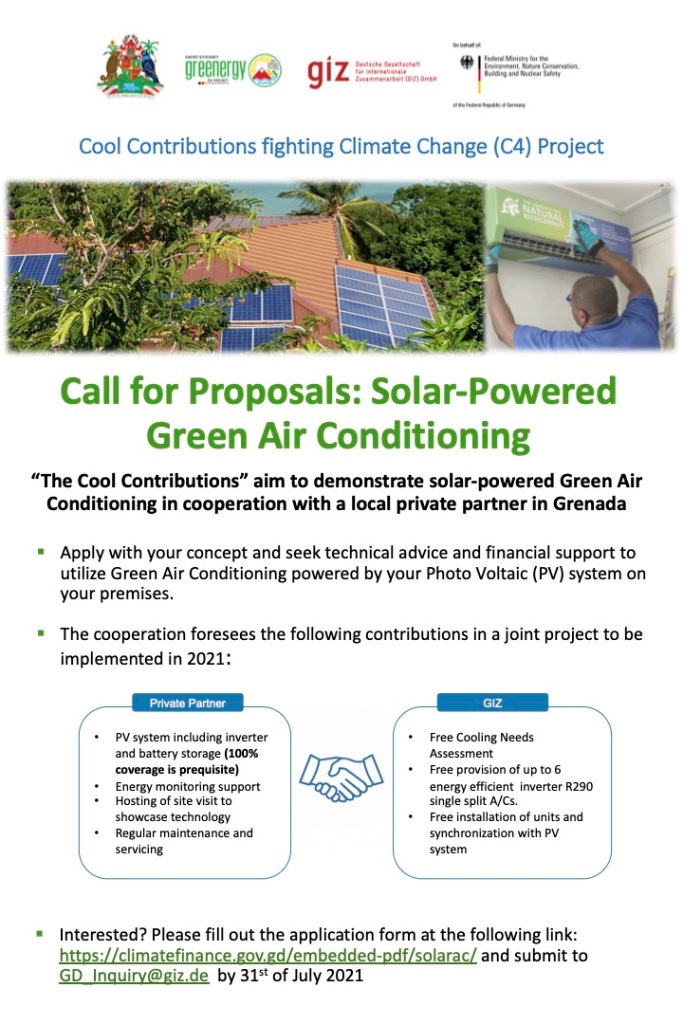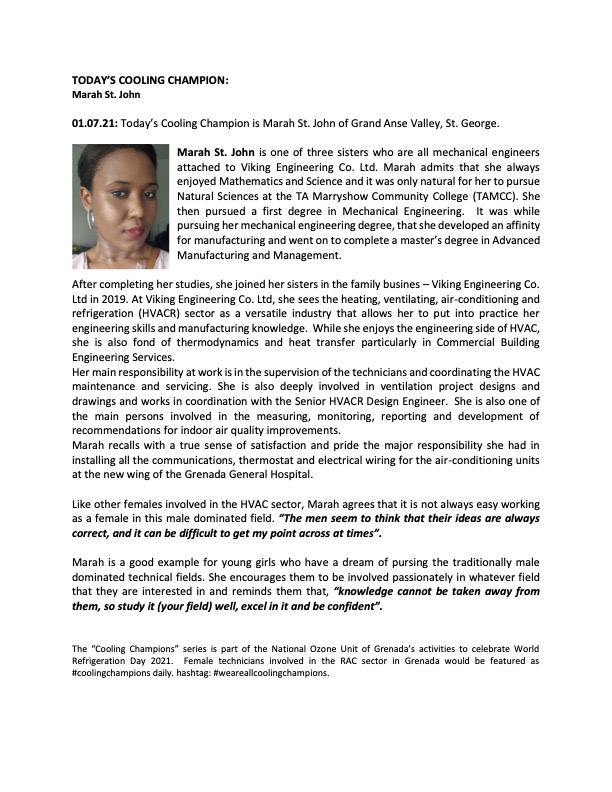The National Ozone Unit and GIZ Proklima launched the second phase of the Cool Contributions fighting Climate Change in Grenada. Read more at the link below:
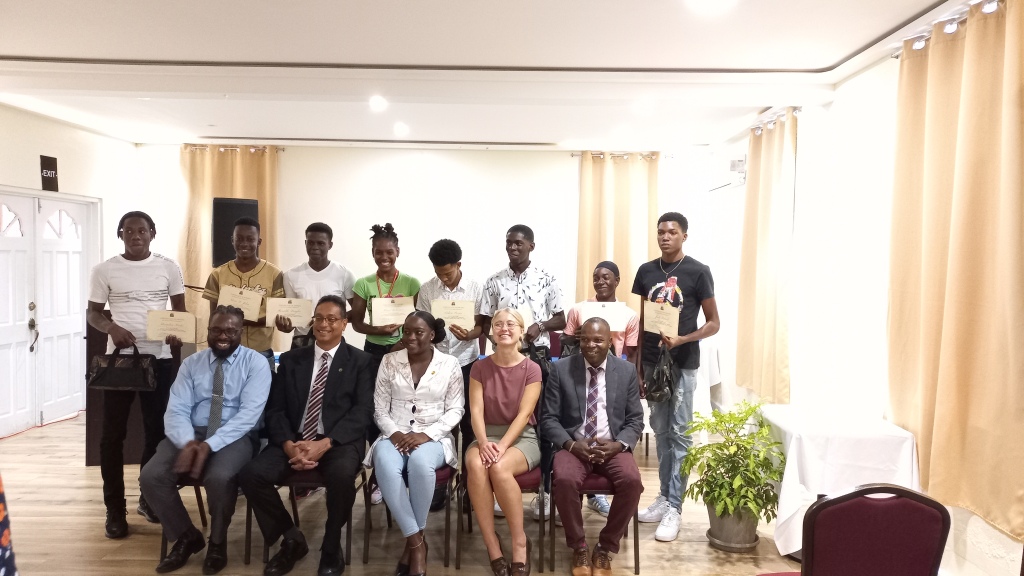
National Ozone Unit (NOU), Grenada. Nine (9) first year students and one (1) second year student were among ten (10) students awarded full scholarships to pursue the refrigeration and air-conditioning (RAC) Associate Degree program at the T A Marryshow Community College (TAMCC).
The presentation the scholarships were made during a special ceremony to celebrate World Ozone Day, on September 16th, 2022.
The aim of the scholarship is to assist in exposing students to proper training in good refrigeration practices and new and emerging alternative technologies that can be adapted in their practices to protect the ozone layer and safeguard the climate system.
The scholarships cover full tuition for both years of study once the student maintains a GPA of 2.5 and over. In addition, each student was given a tool kit which will assist them as they go on to practice their newly acquired skills. The total value of the scholarship for the first year is over USD 5,000. The scholarship instruments and tool kits were presented by the Minister for Climate Resilience, the Environment, Hon. Kerry James and Principal of TAMCC, Dr.Ronald Brunton, respectively.
Hon. Kerryne James, spoke to the scholarship recipients about the importance of education in national transformation. She said, “always use your youth as a weapon for success and the only way you can do that is through the power of education and understanding its value.”
Principal of TAMCC, Dr. Ronald Brunton in his address reminded the audience, that, “TAMCC is not just an academic institution, we do have a very strong technical vocational skills training programmes and the college must be able to produce graduates who have the skills, knowledge and attitudes to transform the nation.”
The scholarship program was first launched in 2011 – 11 years ago and over these years over 30 students have benefitted before 2022. The NOU in the design of the scholarship program guarantees placement for 20% of the awardees to be females. Three young ladies were awarded – two first year students and one in her second year.
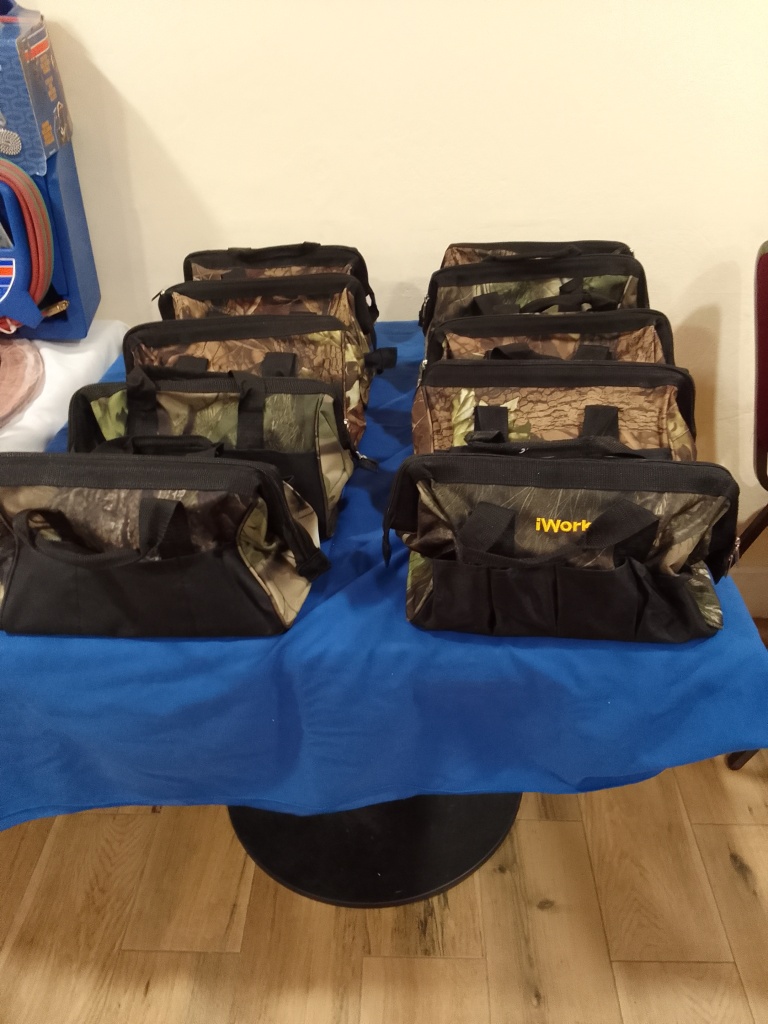

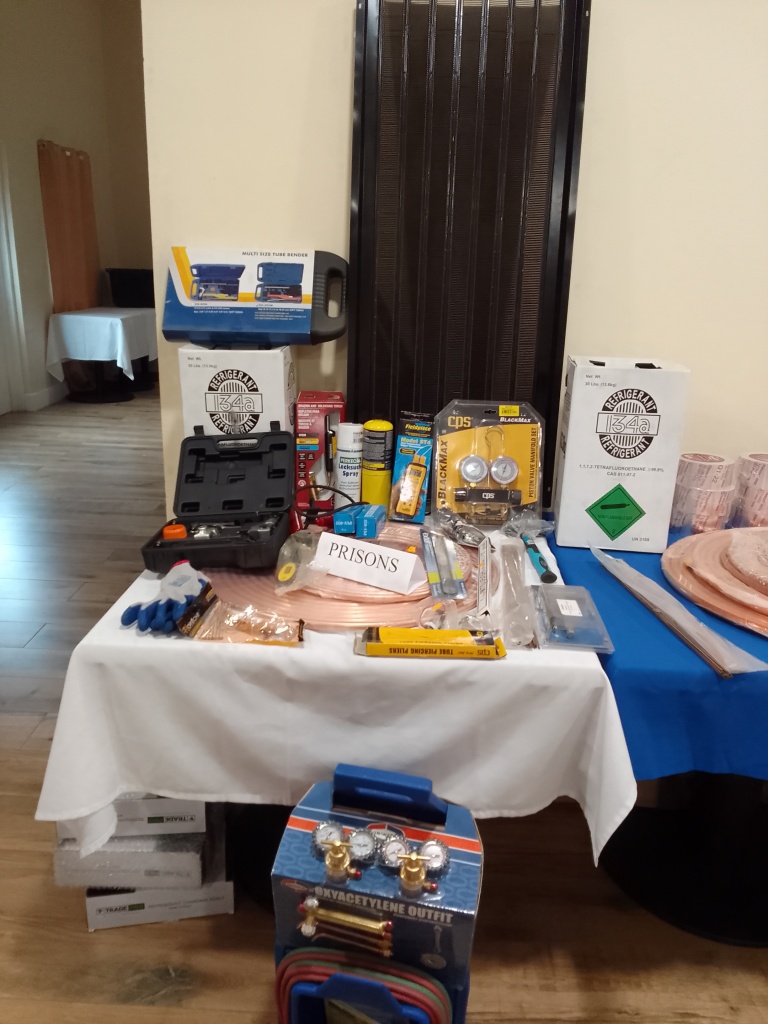
National Ozone Unit (NOU), Grenada. Twenty-five (25) young men who are inmates at His Majesty’s Prisons, have been handed a second chance through the MPower 3.0 Programme launched by the Ministry of Youth Sports and Culture.
The 1-year programme provides young men between the ages of 18–35 with opportunities for self-empowerment, holistic development, skills certification, and employment. One of the courses offered under this program for inmates at the prison is the Caribbean Vocational Qualification (CVQ) Level 1 in refrigeration and air-conditioning.
The National Ozone Unit, as part of the Capacity Development Component of the Phase-out Management Plan for ozone depleting substances (ODS) provided training equipment and materials to support the program. The presentation was made by the Minister for Climate Resilience, the Environment and Energy, Hon. Kerryne James during commemorative ceremony on September 16th, to celebrate World Ozone Day, 2022.
National Ozone Officer, Mr Leslie Smith in commenting on the gesture from the NOU said, “this was a request we definitely could not ignore and had to take seriously; this program can actually transform the lives of these individuals”. The request for the training equipment was also very timely, since at the time it was made, preparations were underway to provide RAC equipment to institutions that have a RAC training program.
The equipment provided included: welding set, charging scale, thermometers, multi meters, voltage tester, filter driers, condenser, swaging and flaring tool, tube cutters, refrigerant gauge, refrigerants, copper tubes and personal protective equipment, among others. The total value of the donation is in excess of USD $3,000.
The NOU has pledged to work along with the Commissioner of Prisons to assist in further training of the inmates and to seek opportunities for them when they are released from prison.
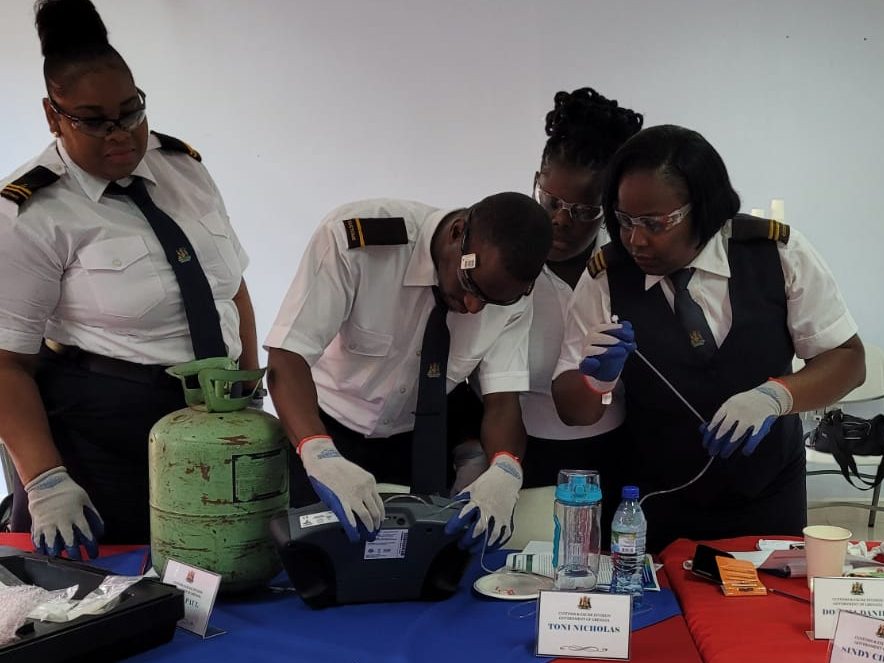
National Ozone Unit, Grenada. Fifteen (15) Customs and Trade Officers particpated in a one day training workshop on Control and Monitoring Trade in Ozone Depleting Substances (ODS) organised by the NationalOzone Unit (NOU) as part of a week of activities to celebrate World Ozone Day 2022.
The Custom & Excise Division of the Ministry of Finance is one of the major stakeholders of the NOU. Customs Officers are required to perform several roles for the NOU. Among the many roles required to be performed by Customs Officers are: enforcement of the licensing and quota system, inspection of vessels and cargo, identification of ODS and ODS-based equipment, checking and reviewing of documentation and reporting import data on an annual basis to the NOU.
The Trade Officers also has a key responsibility as they are responsible for the approval of the import license for all refrigerants and assist in managing the quota system that is established by the NOU.
Several topics centered around prevention of illegal trade were covered including: smuggling techniques, the revised Harmonised System (HS) Codes and ODS classification, reporting requirements, labels and documentation. Other topics included were: the Montreal Protocol, the science of the Ozone Layer and the National and International response to ozone layer depletion. The training also included practical exercises in the use of refrigerant identifiers.
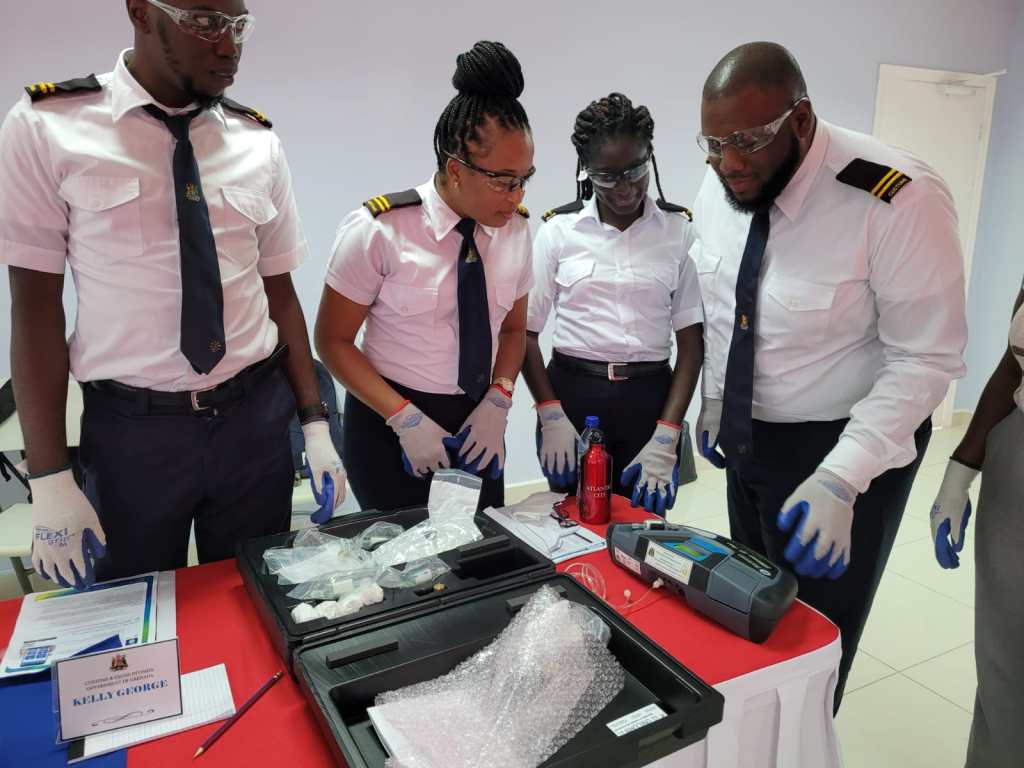
This training forms part of Grenada implementation activities of Stage I of the Hydrochlorofluorocarbons (HCFC) Phase out Management Plan (HPMP) for ODSs.
Permanent Secretary in the Ministry of Climate Resilience, the Environment and Renewable Energy, Mrs. Merina Jessamy and Deputy Comptroller of Customs, Mr. Rickie James were on hand to present certificates of participation to the officers.
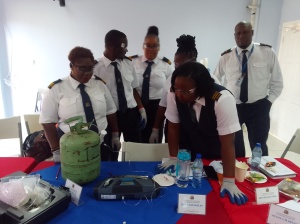
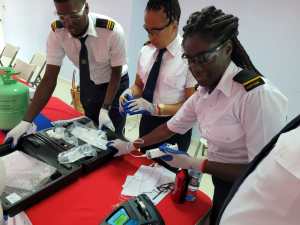
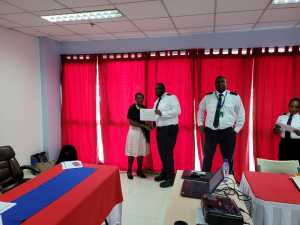

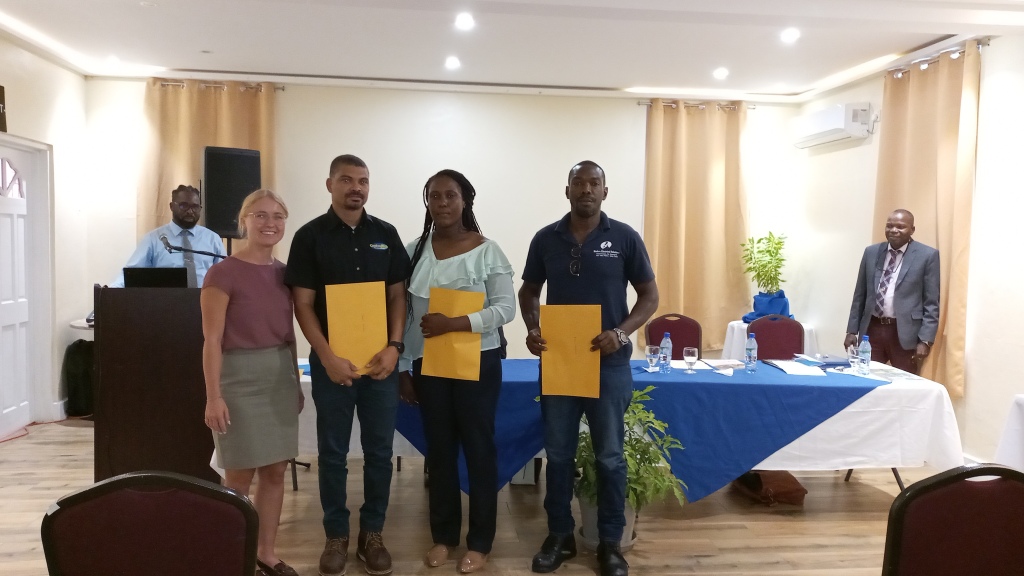
National Ozone Unit (NOU) Grenada. During the commemorative ceremony to celebrate World Ozone Day 2022, the National Ozone Unit, Grenada announced the names of the the three refrigeration and air-conditioning (RAC) technicians that were nominated to pursue the two week training in Natural Refrigerant training (Cool Training) in Germany, from October 3-14, 2022.
The overall objective of the Cool Training initiative is to spread in-depth knowledge and enhance the capacity to operate and maintain cooling technologies based on natural refrigerants. Participants would learn about the use of hydrocarbons (R600a & R290) and CO2 (R744), as well as ammonia (R717) in commercial applications. The training includes two visits to innovative German companies, such as natural refrigerant producers, RAC component manufacturers and refrigeration plants. The training heavily emphasises hands-on practical sessions (70% practice, 30% theory), creating expertise that can be applied immediately in the participant’s line of work.
The National Ozone Unit has established as a policy in the National Cooling Action Plan (NCAP) that was launched in early 2021, to leap-frog the high global warming (GWP) fluorinated gases used in the RAC sector with the environmentally friendly, natural refrigerants, as the long term replacement refrigerant.
The RAC technicians nominated to attend the training were selected from two local local companies that supply RAC appliances that use natural refrigerants in Grenada and from leading tertiary institution for vocational studies, the TA Marryshow Community College (TAMCC).
The three are: Allan Mitchell – Modern Electrical Solutions, Colville Julien – Cooling Tech Limited and Marah St. John (Ms.) – TAMCC. This brings to eleven (11) the number of local technicians to receive that level of training in Germany. In the case of Ms. Marah St. John, who is a tutor in HVAC technology at TAMMC, she is the first female Grenadian technician to attend the Cool Training in Germany.
The three technicians were presented with confirmation letters from the GIZ Proklima representative who was visiting Grenada to launch the Phase II of the Cool Contributions frighting Climate Change (C4) Project, Ms. Lara Alexandra Teusch.
Funding for the participants is facilitated under the Cool Contributions fighting Climate Change (C4) Project funded by the Federal Government of Germany and implemented by German Implementing agency GIZ Proklima. The National Ozone Unit is the national executing agency of the C4 Project.
Outdated air-conditioners can worsen the climate crisis and put energy security in peril. Millions of inefficient air-conditioners used at the same time can put the power grid to such strain that it can collapse.
Air conditioning has a climate problem. New technology could help
Last week, Californians got a reminder of one of the most vexing paradoxes of global warming. With temperatures well over 110 degrees Fahrenheit in some regions on Tuesday night, hundreds of thousands of the state’s residents received beeping text alerts to notify them that the power grid, straining under the weight of millions of air-conditioning units, was about to collapse. Save power now, the text warned, or face rolling blackouts.
Consumers conserved, and the state’s electricity grid made it out of a record-breaking hot day relatively unscathed. Still, as temperatures rise worldwide, more people are going to need to install air conditioners. Butas currently sold, AC units can actually make global warming worse: On hot days, they suck tons of electricity from the grid, and their chemical refrigerants can accelerate global warming. This is why researchers and start-ups arehoping to create new, cutting-edge AC units. AC technology has seen only “incremental improvements over the past 100 years,” said Ankit Kalanki, a manager at Third Derivative, a climate tech accelerator co-founded by the energy think tank RMI. “There has not been a step change in innovation.”
The good news is that companies are hurrying to develop more efficient ACs. The question is whether they will be ready in time.
Current ACs aren’t going to cut it
Over the next few decades, the global demand for air conditioning is expected to skyrocket. According to the International Energy Agency, the number of AC units in buildings across the world should reach 5.6 billion by 2050, up from only around 2 billion units today. But unless air conditioning gets an efficiency revamp, all those ACs are going to put unprecedented strain on the electricity grid. Air conditioners and electric fans already account for approximately 10 percent of electricity consumption worldwide. On extremely hot days, AC efficiency drops, as the units have to work harder to move heat from indoors to outdoors. During a heat wave, millions of people come home and turn on their ACs at the same time, somewhere between the hours of 4 p.m. and 9 p.m. When that happens, air conditioning can account for a whopping 60 to 70 percent of electricity demand, and shake grids like California’s. Meanwhile, the key component of modern air conditioners — chemicals known as refrigerants — have been the bane of the atmosphere for decades. ACs work by exposing a liquid refrigerant, a chemical with a low boiling point, to hot indoor air. That heat causes the refrigerant to evaporate into gas, cooling the air. A compressor then turns the refrigerant back into liquid and repeats the process.
The problem is that refrigerants can leak out of air conditioners, both during use and, more commonly, when the ACs are discarded. Early ACs were largely made with chlorofluorocarbons, or CFCs, which were responsible for one of the first truly global climate anxieties: the hole in the ozone layer. CFCs were phased out by the 1987 Montreal Protocol, an international treaty to counteract ozone hole depletion, and eventually replaced by hydrofluorocarbons, or HFCs. But HFCs have their own problem — they are greenhouse gases that, in the short term, are thousands of times more potent than carbon dioxide. An amendment to the Montreal Protocol has HFCs set to phase down dramatically by the mid-2040s; in the meantime, however, they’re still contributing to global warming
The next generation
There are a lot of ways to make existing AC technology more efficient.Some newer AC units use different refrigerants, such as one known as R-32, which has less planet-warming potential than other hydrofluorocarbons and also takes less energy to compress, thus saving electricity. Other units use technology known as “variable speed compressors,” that allow the unit to run on different settings. The compressor can speed up if it’s 100 degrees Fahrenheit and sweltering, or slow down if it’s only 85 degrees. That can help save on electricity and utility bills. And more advanced models are just around the corner. Kalanki was one of the leaders of an initiative at RMI known as the Global Cooling Prize, which rewarded manufacturers who could produce affordable AC prototypes that would be at least five times better for the climate than existing models. Two companies received the prize in tandem: Gree Electric Appliances and Daikin Industries. Both used traditional vapor compression technology but with improved refrigerants and clever designs that could change settings in response to outdoor temperatures.
Other companies, start-ups, and researchers are investigating whether they can ditch vapor compression entirely. A start-up called Blue Frontier uses a liquid that sucks moisture from the air and stores it in a tank to control the temperature. According to the company, this approach could save up to 60 percent of the electricity required to run an AC year-round. And a group of researchers at Harvard University has developed an air conditioning prototype that they call coldSNAP. The prototype doesn’t use a refrigerant, but uses a special coating on a ceramic frame to evaporate water to cool the indoor space without adding moisture to the air. “Because we don’t have the vapor compression system and the energy of trying to release and compress the refrigerants, the energy consumption of these systems is far, far lower,” said Jonathan Grinham, one of the researchers on the project.
What to look for when buying
Some of these new designs may take years to reach the market, and when they do, they may still be more expensive than conventional ACs. But in the meantime, Kalanki says, there are still lots of options to buy a more efficient AC unit.“There are technologies that are two to three times more efficient than the most common ACs on the market today,” Kalanki said. “The challenge is that adoption is very low.” Most consumers, he argues, are just looking at the sticker price on an air conditioning unit, and ignoring the fact that buying a more expensive unit upfront could save them money in the long run. He recommends that buyers look at three things when considering an AC unit: The type of refrigerant used, the efficiency rating, and whether the unit has a variable-speed compressor or not. Those metrics can tell consumers whether their unit is likely to cost them thousands of dollars in electricity bills down the line, and whether it will add unduly to the problem of climate change. Ultimately, he added, the government needs to set stricter performance standards for air conditioners so that all ACs on the market — not just higher-end ones — are efficient and safe for the planet. “There are regulations in place to set the floor for air conditioners,” he said. “But that floor is a bit too low.”
Source: The Washington Post Climate and Environment, by Shannon Osaka
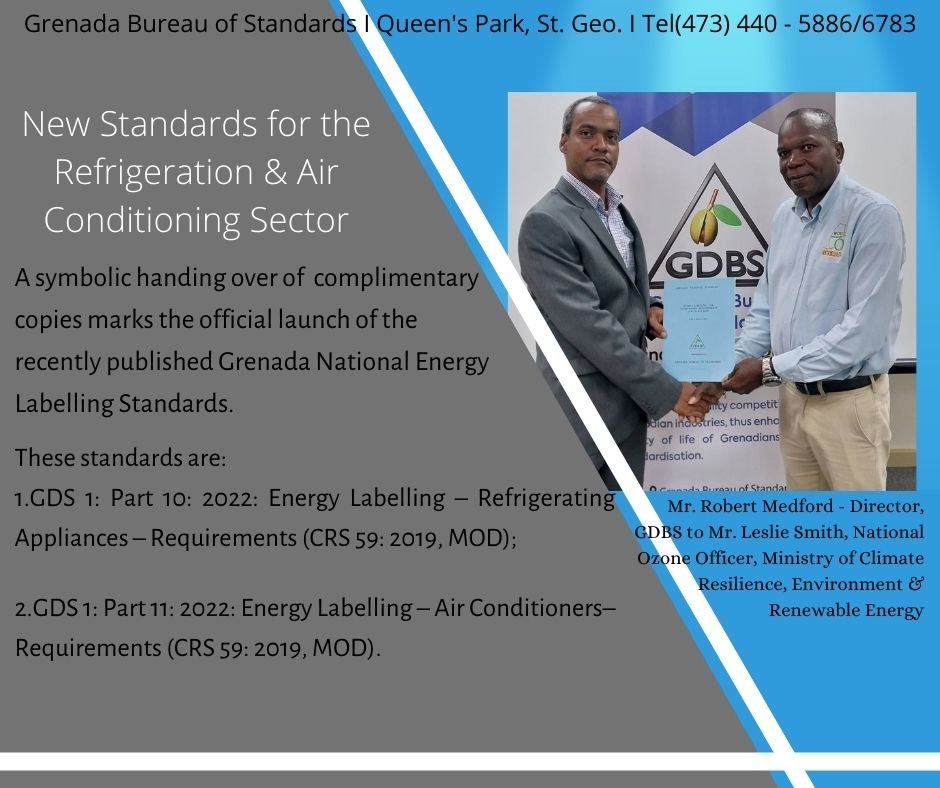
A symbolic handing over of two complimentary copies of the recently
published Grenada National Energy Labelling Standards marked the official
launch of the standards. The handing over was done by Mr. Robert Medford,
Director, Grenada Bureau of Standards to Mr. Leslie Smith, National Ozone
Officer in the Ministry of Climate Resilience, Environment & Renewable
Energy.
The Grenada National Standards:
- GDS 1: Part 10: 2022: Energy Labelling – Refrigerating Appliances –
Requirements (CRS 59: 2019, MOD) and - GDS 1: Part 11: 2022: Energy Labelling – Air Conditioners–
Requirements (CRS 59: 2019, MOD)
were gazetted earlier this year as declared Grenada National Standards.
The two energy labelling standards are voluntary, modified adoptions of a suite
of three regional energy labelling standards.
Request for the adoption of the standards came from the National Ozone Unit
(NOU) as part of the NOU’s national programme to meet Grenada’s obligations
under the Montreal Protocol.
GDS 1: Part 10: 2022: Energy Labelling – Refrigerating Appliances –
Requirements (CRS 57: 2019, MOD)
Scope of the Standard
This standard establishes the minimum energy performance standards (MEPs)
for refrigerating appliances and relevant test method to specify the energy label.
It also specifies the energy label requirements.
GDS 1: Part 11: 2022: Energy Labelling – Air Conditioners –
Requirements (CRS 59: 2019, MOD)
Scope of the Standard
This standard specifies the energy labelling requirements and the Minimum
Energy Performance Standards (MEPS) requirements for non-ducted air-
conditioners, single-package and or split-system, with only one interior unit, via
the following parameters:
- Energy efficiency ratio (EER);
- Coefficiency of performance (COP).
Additional Information
Both standards are intended to improve the energy performance of refrigerators
and air conditioners.
In addition, the requirements of the standards are expected to drive
manufacturers, importers and retailers to provide more energy efficient
refrigerators and air conditioners options to consumers, as they compete to offer
value for money.
The Energy Labelling standards are aligned with the CARICOM Energy Policy
and its objectives which state inter alia:
- increase energy efficiency and conservation in all sectors;
and - establishment and enforcement of labelling and standards for
the importation of electrical appliances.
The implementation of the standards is expected to achieve the following:
- increase the usage of energy efficient refrigerators and air
conditioners and - reduce the electricity consumption of Grenadian households
and businesses.
This initiate is also in line with Grenada’s nationally determined contribution
(NDC) under the Parris Agreement aimed at reducing Carbon Dioxide
emissions at the national level.
Hard copies of the standards can be purchased at the Grenada Bureau of
Standards office in Queen’s Park, St. George’s.
The United Nations Development Program (UNDP) is seeking to hire a consultant to review and develop financial incentives for low carbon energy and energy efficiency (such as a carbon tax and feebates), including an analysis of socioeconomic and environmental impacts, including the RAC sector (HCFCs, HFCs) for Grenada. The consultant will also support the drafting of a financial plan for the implementation of the National Cooling Action Plan.
| Duties and Responsibilities |
| The main objectives of this assignment are to develop financial incentives for the Government of Grenada geared toward the transition to a low carbon energy and energy efficient state. The consultant is expected to analyse the environmental and socioeconomic impacts of this transition, particularly in the RAC sector (with particular focus on CO2, HCFC, and HFC emissions). The consultant is also expected to analyse the National Cooling Action Plan (NCAP) and support the Government by quantifying the activities delineated in the plan and develop a financial plan for the implementation of the NCAP.The consultant is therefore expected to conduct/provide the following: The work will be conducted in alignment with the National Cooling Action Plan and as such the consultant is expected to: (1) Analyse all relevant national energy, environment, and climate change documents to ensure that the national context is effectively incorporated into the assignment. (2) Analyse the NCAP and develop a financial plan for the implementation of the NCAP and its targets. This should be an assessment of the anticipated cost of the activities outlined in the NCAP. These costs should be disaggregated by the respective components and where possible activities to identify each component’s contribution to the overall cost for the implementation of the activities to the NCAP. The financial plan should also include incentives for investment in energy efficient technology particularly those aligned with activities outlined in the NCAP. (3) The consultant is expected to conduct consultations (workshops and meetings) with the National Ozone Unit and national stakeholders as part of the data collection process and for the review of any prepared documents. A record of all consultations and/or meeting (including participants and their agencies/organisations) should be maintained an included as an annex to the final report. Required Skills and Experience Master’s Degree (or higher) Mechanical Engineering, Electrical Engineering, Environmental Science & Technology, or in a relevant field. Working experience of at least 7 years at a senior level with policy planning in the environmental and/or RAC sector; Experience in research, data collection, assessment and/or surveys, preferably in the RAC sector. Knowledge of Montreal Protocol and Kigali Amendment related issues and its associated Policies and Agreements [is desirable]; Experience in developing, reviewing, expanding climate change and sustainable development related reports, strategies or similar. |
More information on how to apply can be found here. https://jobs.undp.org/cj_view_job.cfm?cur_job_id=102251
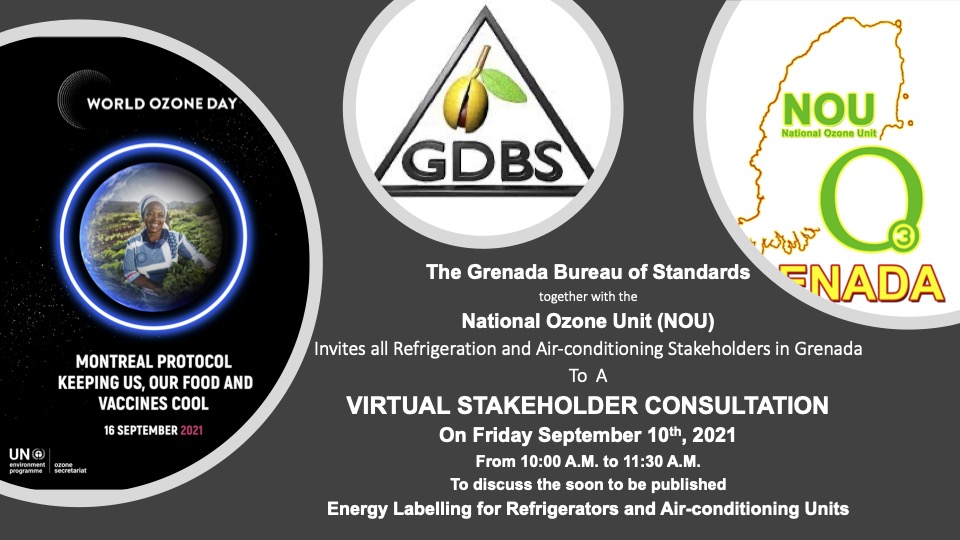
The Grenada Bureau of Standards (GDBS) together with the National Ozone Unit (NOU) have been working along with a Technical Committee set up to develop energy labelling standards for refrigerators and air-conditioners since 2019. Although the work of the Technical Committee was impacted by the global pandemic, significant advancements have been made with the development of these standards. In the case of the energy labelling standards for refrigerators, this standard has gone through all the stages of development and is now ready for approval and publishing by the Council of the GDBS. The Energy labelling standard for the ACs on the other hand has just completed the period for public comments. This would bring to four, the number of standards developed by the GDBS for the RAC sector in Grenada.
The GDBS and the NOU has organised a Virtual Stakeholder consultation to afford one more opportunity to RAC stakeholders in Grenada to have their final contribution to the draft standard for ACs. This consultation would take place on Friday 10th September, 2021 from 10:00 a.m. to 11:30 a.m. The NOU is encouraging all RAC stakeholders to participate in this very important consultation, particularly, importers of RAC equipment.
The link for the consultation can be obtained from the National Ozone Unit. Please contact the NOU at nou@gov.gd or smithld31@gmail.com or telephone 435 8708.
The project preparation report for Grenada’s HCFC Phaseout Management Plan (HPMP) Stage II is well on the way with the completion of the data collection survey. Over a four month period stakeholders of the refrigeration and air-conditioning sector in Grenada were engaged in a data collection process on consumption of ozone depleting substances and related equipment.
During a stakeholder consultation and data validation workshop held on August 24th, 2021, lead consultant, Mrs. Terah Antoine presented a summary of the findings to the participants. Participants included a wide cross section of stakeholders representing the refrigeration and air-conditioning (RAC) technicians, importers of refrigerants and RAC equipment, Customs Officers, Ministry of Trade Officials, training institutions, the Grenada Bureau of Standards and the Grenada Solid Waste Management Authority.
Several significant observations were made from the data presented. Less than 20% of the total refrigerants imported into Grenada are ozone depleting substance (ODS), HCFC-22. This was not the case in 2009 when the last HPMP data survey was conducted that indicated HCFC 22 was the dominant refrigerant imported at the time. Of greater significance is the revelation that the the stocks of installed HCFC 22 equipment has been reduced from just under 19,000 pieces of equipment in 2009 to less than 500 pieces in 2021. This has been the main driver towards the drastic reduction in the dependence of R-22 refrigerants for the servicing of these equipment. HCFCs have been predominantly used for servicing air-conditioning systems (mini-splits and commercial ducted) and commercial refrigeration systems.
The replacement refrigerants have been the hydrofluoroacarbons (HFCs) with zero ozone depleting potential (ODP). There is also evidence of increasing trends in the use of natural refrigerants, R-600A in the domestic refrigeration sub-sector together with R-290 and the low global warming potential (GWP), R-32 in unitary split AC systems.
Several factors can be attributed for the significant reduction in the HCFC equipment. Among the main reasons is the role played by the NOU in promoting alternative ozone friendly technologies through its public awareness and education activities and capacity development for RAC technicians. The private sector and RAC technicians have also played a major role in offering incentives to replace HCFC equipment, discontinuation of imports of HCFC equipment and providing up to date information to end-users in making information decision on technology choices.
The consumption data indicates that Grenada has already phased out approximately 79% of ODSs relative to the baseline established in 2010. This results means that the country is ahead of the Montreal Protocol targets for 2020 (35% reduction) and 2025 (67.5% reduction) and well on the way to a complete phase outline before 2030.
The National Ozone Unit (NOU), Grenada recently published Grenada’s National Cooling Action Plan (NCAP) to signal early and ambitious actions as a signatory to the Kigali Amendment to the Montreal Protocol. Work on the NCAP began in 2018 as part of the Cool Contributions fighting Climate Change (C4) project with support from GIZ Proklima.
The overarching objective of this NCAP is to reduce the direct and indirect greenhouse gas (GHG) emissions associated with the refrigeration and air-conditioning (RAC) sector and create a stronger and more sustainable energy and building infrastructure.
The NCAP in its undertakings establishes a strong linkage with Grenada’s Nationally Determined Contributions (NDCs) for synergistic and mutual achievements of the country’s Montreal Protocol and Paris Agreement commitments, as well as, contributing to meeting the country’s 2035 sustainable development goals.
The Grenada NCAP has been developed utilizing information acquired from a comprehensive GHG inventory of the RAC sector and the inclusive contributions of all RAC stakeholders. This plan constitutes the core implementation activities that Grenada would undertake to promote its green and sustainable cooling initiatives under six broad headings. The successful implementation of the NCAP is expected to contribute to the global efforts and targets of the Kigali Amendment, to reduce global atmospheric temperature by 0.4°C by the end of this century.
Related story
The National Ozone Unit (NOU), Grenada has organised a Joint Virtual stakeholder Meeting and Data Validation Workshop to present the findings and a summary of data collected and the verification of consumption data for HCFC’s (R-22).
This consultation and validation workshop would engage all the key stakeholders of the refrigeration and air-conditioning sector in Grenada.
The input of all stakeholders is key to the development of the plan of action for the phase down of the remaining ozone depleting substances in Grenada.
An invitation is extended to all refrigeration and air-conditioning stakeholders (inclusive of importers and technicians) in Grenada to attend this very important consultation on Tuesday August 24th, 2021, at 9:30 am.
Please contact the NOU at telephone number 435 8708 0r nou@gov.d for the link tothe meeting.
Private sector entities interested in obtaining up to 6 Green Acs using natural refrigerants can submit their proposals by completing the application form at the following link: https://climatefinance.gov.gd/embedded-pdf/solarac/
